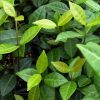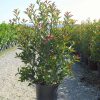Why Mulch?
Besides proper watering mulching is one of the most important things you can do for the health of newly planted and established trees and shrubs. Mulch is usually an organic material such as shredded or ground wood bark used around the soil surface to help maintain moisture, control soil temperature and reduce weeds as well as improving the condition of the soil. Mulching reduces water loss caused by evaporation from the soil, minimizes weed population, and helps improve the soil structure. When properly applied, mulching gives the landscape a finished clean appearance. Mulch must be applied properly! If it is applied too deep or if the wrong type of mulch is used, it can actually cause significant damage or death to trees, shrubs and other landscape plants.
Benefits of Mulching
- Mulching helps maintain soil moisture. Reduces soil temperature, and the loss of moisture from evaporation, therefore lessening the need for excess water.
- Mulching helps to control weeds naturally. Applying a 2 to 4 inch layer of mulch around the base of all trees and shrubs will help to prevent the germination and growth of new weeds.
- Mulching actually insulates the soil like a blanket. Keeping the soil warm in the winter and cool in the summer.
- As certain types of mulches decompose they can actually improve the soil by loosening the soil particles witch over time helps with aeration and drainage.
- Mulching also benefits the plant by releasing vital nutrients as it decomposes. Nutrients needed for healthy plants.
- Mulching around trees helps reduce the chances of injury to trees from weed eaters and other lawn equipment.
- Regular mulching gives the landscaped areas a finished and well-maintained look.
- Some types of mulch can help to repel insects.
- Mulching helps control fungi from spreading from splashing water on to the foliage. This helps to control any possible soil borne diseases from spreading from ground to plant.
When mulching around trees and shrubs you should include as much of the root zone as possible. For larger trees or shrubs, the mulched area should cover at least 4 to 6 feet from the trunk of the plant. It’s a good idea to keep the mulch at least 1 to 2 inches from the trunk of the plant to prevent damage. When wet or moist mulch is kept too close the trunk or lower limbs of a plant it can cause the outer layer of bark to decay; this can suffocate the plant eventually causing it to die. When mulching around small plants mulch the entire bed instead of mulching each individual plant.
Mulching can be done just about any time of the year. The best time to mulch is late spring after the soils have warmed and again in the early summer as the temperatures begin to rise. Mulching too early can delay soil warming witch can slow plant growth.
Pine Bark Mulch
Pine Bark mulch comes from several types of pine and fir trees. This product comes in nugget form and the most popular shredded or finely ground pine mulch. The Nugget form offers a more decorative look as well as lasting longer. Shredded pine bark mulch helps to condition the soil as it slowly decays, helps maintain moisture and deters weeds. Pine bark mulch breaks down quickly, so it may be necessary to reapply every three months or so.
Hardwood Mulch
Hardwood mulch comes from chipped or shredded branches of small trees and other various wood sources. As it breaks down Hardwood mulch becomes alkaline, benefiting all plants but those that require acid. Also helps reduce weeds, conserve moisture and control soil temperatures as well. As it ages hardwood mulch tends to turn a light gray color, it’s a good idea to turn it a couple times a year and replace it every two years.
Pecan Mulch
Pecan Mulch comes from pecan shells, a natural product of the Texas pecan industry. Pecan shells make an excellent mulch that can be used around all trees, shrubs and beds. Pecan Mulch helps to conserve water. Also deters weeds and helps to reduce the soil temperatures. It also helps lower the pH level and helps make valuable nutrient available to the soil. Pecan Mulch is acidic with a pH of less than 5; this makes it an excellent addition to our alkaline soils.
Cedar Mulch
Cedar Mulch is made from Mountain Cedar Trees from various Texas regions. The natural cedar oils keep this mulch from decomposing too quickly, making it an excellent long lasting landscape much, lasting two to three times longer than most other mulches. Its pleasant cedar scent also helps to naturally repel insects. Cedar Mulch also helps to deter the weed population, reduce the soil temperature and conserves water by limiting the chance of runoff as well as controlling loss of moisture due to evaporation.
Cypress Mulch
Cypress mulch is made from Bald Cypress and Pond Cypress trees. The bark and the wood are shredded or ground up to make Cypress Mulch. The mulch is available as shredded Cypress Mulch. Shredded is the best choice because shredded cypress stays in place longer and it does not float away like other mulches tend to do. Cypress Mulch has a neutral pH so it does not change the pH of the soil as it decomposes. Cypress Mulch also keeps the soil cool and insulates plant roots during hot temperatures as well as warming during cold temperatures. It also deters the growth of weeds.



